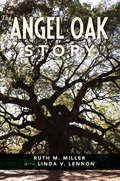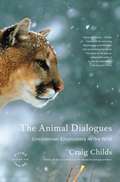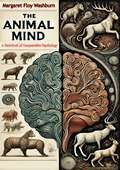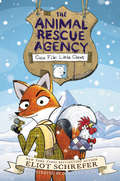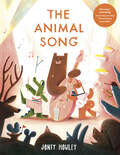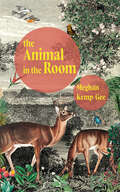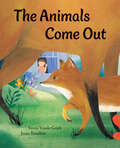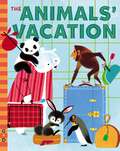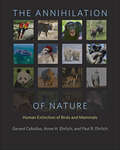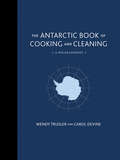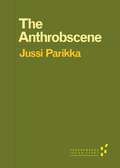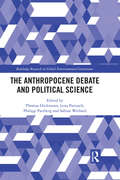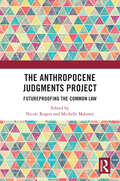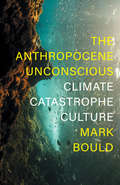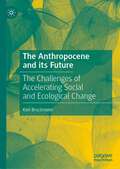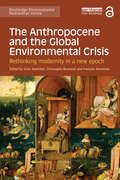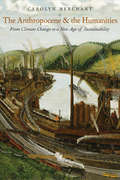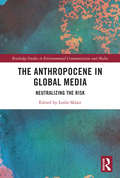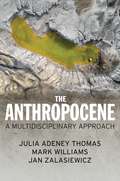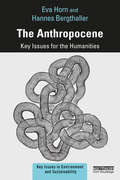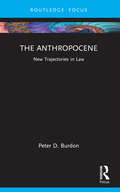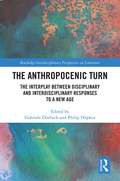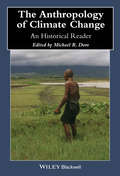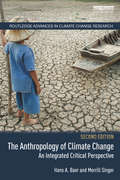- Table View
- List View
The Angel Oak Story
by Ruth M. Miller Linda V. LennonAngel Oak is estimated to be more than 400 years old. The story of the live oak begins with the "purchase" of Johns Island from the Cussoe Indians by a representative of Sir Anthony Ashley Cooper in 1675. The land upon which the tree grows was then granted to Abraham Waight in 1717. The oak garnered its name when descendant Martha Waight married Justus Angel. This same family maintained ownership of the property for 242 years. Today, the Angel Oak is owned by the City of Charleston. Authors Ruth M. Miller and Linda Lennon describe life on Johns Island through 300 years and the special place the tree has held in the hearts of Lowcountry residents. A foreword was provided by Becky Woods, communications manager for the Lowcountry Land Trust.
The Animal Dialogues: Uncommon Encounters in the Wild
by Craig ChildsColorado-based naturalist Childs presents another volume of vignettes, some taken from his 1997 Crossing Paths and other written since then. Each describes an encounter with a non-human animal, among them raccoon, raven, pronghorn antelope, and praying mantis. He has not indexed the collection. Annotation ©2008 Book News, Inc., Portland, OR (booknews.com)
The Animal Game
by Daniel E. BenderTracing the global trade and trafficking in animals that supplied U.S. zoos, Daniel Bender shows how Americans learned to view faraway places through the lens of exotic creatures on display. He recounts the public's conflicted relationship with zoos, decried as prisons by activists even as they remain popular centers of education and preservation.
The Animal Mind a Text-Book of Comparative Psychology
by Margaret Floy Washburn"The Animal Mind: A Text-Book of Comparative Psychology" by Margaret Floy Washburn is a seminal work that offers an in-depth exploration of animal behavior and cognition, bridging the gap between psychology and zoology. As one of the first comprehensive textbooks in the field of comparative psychology, Washburn's groundbreaking work provides valuable insights into the mental processes of various animal species, laying the foundation for future research in animal cognition.Washburn, a pioneering psychologist and the first woman to earn a Ph.D. in psychology in the United States, meticulously examines the sensory experiences, instincts, emotions, and intelligence of animals. Drawing on extensive research and observational studies, she presents a thorough analysis of how animals perceive the world, make decisions, and exhibit behaviors that parallel human psychological processes."The Animal Mind" covers a wide range of topics, including perception, learning, memory, and problem-solving abilities in animals. Washburn's clear and engaging writing style makes complex concepts accessible, while her rigorous scientific approach ensures the reliability and depth of the information presented. Each chapter delves into specific aspects of animal psychology, supported by detailed examples and comparative analyses across different species.Washburn's work is notable for its balanced perspective, considering both experimental data and anecdotal evidence to provide a holistic view of animal minds. She emphasizes the importance of understanding animal behavior not just for its own sake but also for the insights it offers into human psychology and the evolutionary continuity of mental processes."The Animal Mind" is an essential resource for students, researchers, and anyone interested in the study of animal behavior and cognition. Margaret Floy Washburn's pioneering contributions continue to influence the field of comparative psychology, making this textbook a timeless and invaluable reference for understanding the complexities of animal minds and their remarkable similarities to human thought and behavior.
The Animal Rescue Agency #1: Case File: Little Claws (Animal Rescue Agency #1)
by Eliot SchreferAn Amazon Best Book of the Month! New York Times bestselling author Eliot Schrefer introduces a delightful and dynamic animal duo in a race against time to save a polar bear cub in the first book of this hilarious and heartwarming middle grade series about friendship and conservation. When an animal is in trouble, there’s only one place to turn: the Animal Rescue Agency! Dashing Esquire Fox used to organize the world’s most elaborate chicken raids until the day she encountered Mr. Pepper. Meeting the blustery old rooster changed her heart, convincing her to turn from a life of crime and instead form the Animal Rescue Agency, which masterminds rescue operations across the globe.Esquire and her unlikely chicken business manager coordinate their far-flung agents to get them to the Arctic. In that frozen land they learn that what happened to the polar bear cub was no accident—and that saving him will pit them against the scariest predator in the world: a human.
The Animal Song
by Jonty HowleyFrom musician and author/artist Jonty Howley comes a lively celebration of friendship and music, perfect for a gentle nighttime read. The story comes with a link to an original song by the author!Snap! Poom-poom! Jingle-Jangle! Three talented animals--a crocodile playing a snare drum, a big brown bear with a bass, and a weasel with a banjo--form a traveling band to sing and play for the other animals in the woods. From spring to fall, they always attract an eager crowd. But when winter comes, the animals in the audience go off to bed and the band searches for a new stage. Skipping their own bedtime, the musical trio parades through the forest, moving on to the next performance until--Snore! Phew! Grumble-grumble!--even the band falls asleep.A rhythmic text interspersed with onomatopoeia make the story in The Animal Song nicely noisy until the very end when--shh!--everyone is asleep. Featuring a website with original music composed by the author/illustrator, this book is perfect for helping young readers to get their sillies out right before it&’s time to sleep!
The Animal in the Room
by Meghan Kemp-GeeLONGLISTED FOR THE GERALD LAMPERT MEMORIAL AWARDDeer with binoculars, wolves with resumes: bioengineered poetry that unsettles truth, fact, and history.Animals are strange testing grounds for thinking about subjectivity, language, the body — really, anything you might want to write a poem about. Together, these poems are an evolutionary chart or a little bestiary – about deer, wolves, evolution, environmental collapse, and extinction. Each one stands alone as a contained organism, but like real animals, they share some genetic material with each other. Considering PTSD and anxiety disorder as a kind of animal experience, a self-protective mechanism, these poems embody the selves we see reflected in the natural world’s creatures. Deer are a way of putting fear and trauma outside yourself, wolves a way to understand the instincts of predators."Oh the pleasure of inhabiting the mind of an animal like Meghan Kemp-Gee! Her poetry is curious, restless, uneasy, and imaginative; it is also highly disciplined, unfolds in precisely measured lines. Watch for brilliant uses of repetition — the slipperiness of meaning, its ever-doubling character, is on full display, played out in deft linguistic twists. A deadpan delivery amplifies the oddity of what’s encountered: arsenic-drunk wildcats, chlorinated orchids, the 'one painful spot of blue' in a deer’s eye. I can’t say strongly enough how grateful I am to have read this collection; don’t miss it." – Sue Sinclair, author of Almost Beauty: New and Selected Poems
The Animals Come Out
by Susan Vande GriekDo you ever wonder what could happen if we all hid away? If we stayed in, we just might see … the animals come out! A delightful series of poems describes the many animals that emerge from the woods, the hills and the skies when we are not around. Peek out your window and watch the deer grazing under the streetlights, the rabbits hopping through our vegetable gardens, and the ducks quack quack quacking along the sidewalks. The Animals Come Out was inspired by the wildlife seen in quieted urban areas during the early days of the COVID-19 pandemic, a situation that young readers may well remember. But this book also encourages readers to be aware that, in fact, we share the outdoors with these animals all the time, and to consider the impact that we have upon them. Key Text Features illustrations Correlates to the Common Core State Standards in English Language Arts: CCSS.ELA-LITERACY.RL.1.3 Describe characters, settings, and major events in a story, using key details. CCSS.ELA-LITERACY.RL.1.4 Identify words and phrases in stories or poems that suggest feelings or appeal to the senses. CCSS.ELA-LITERACY.RL.2.4 Describe how words and phrases (e.g., regular beats, alliteration, rhymes, repeated lines) supply rhythm and meaning in a story, poem, or song.
The Animals' Vacation (G&D Vintage)
by Shel HaberDiscover a treasure trove of beautifully illustrated books with our new series, G+D Vintage! Featuring books from our Wonder Books line originally published in the 1940s, 50s, and 60s, there’s something for every reader in these timeless stories with classic illustrations.It's time for the zoo animals to go on vacation! Their plane makes several stops: a forest for the deer, the North Pole for the polar bear, the mountains for the panda, the jungle for the monkey, and more. But after two months away, the animals are happy to be reunited at the zoo--just in time to welcome Mrs. Kangaroo's baby!
The Annihilation of Nature: Human Extinction of Birds and Mammals
by Paul R. Ehrlich Anne H. Ehrlich Gerardo CeballosEnvironmental scientists reveal the victims of humanity’s massive assault on nature.Gerardo Ceballos, Anne H. Ehrlich, and Paul R. Ehrlich serve as witnesses in this trial of human neglect, where the charge is the massive and escalating assault on living things. Nature is being annihilated, not only because of the human population explosion, but also as a result of massive commercial endeavors and public apathy. Despite the well-intentioned work of conservation organizations and governments, the authors warn us that not enough is being done and time is short for the most vulnerable of the world's wild birds and mammals. Thousands of populations have already disappeared, other populations are dwindling daily, and soon our descendants may live in a world containing but a minuscule fraction of the birds and mammals we know today.The Annihilation of Nature is a clarion call for engagement and action. These outspoken scientists urge everyone who cares about nature to become personally connected to the victims of our inadequate conservation efforts and demand that restoration replace destruction. Only then will we have any hope of preventing the worst-case scenario of the sixth mass extinction.
The Antarctic Book of Cooking and Cleaning: A Polar Journey
by Carol Devine Wendy TruslerThis stunning chronicle of the first civilian Antarctic clean-up project, with contemporary and historic anecdotes and photographs, journal entries, and more than forty delicious recipes, is an intricately woven ode to the last wilderness.With more than 130 full-color photographs
The Anthrobscene (Forerunners: Ideas First)
by Jussi ParikkaSmartphones, laptops, tablets, and e-readers all at one time held the promise of a more environmentally healthy world not dependent on paper and deforestation. The result of our ubiquitous digital lives is, as we see in The Anthrobscene, actually quite the opposite: not ecological health but an environmental wasteland, where media never die. Jussi Parikka critiques corporate and human desires as a geophysical force, analyzing the material side of the earth as essential for the existence of media and introducing the notion of an alternative deep time in which media live on in the layer of toxic waste we will leave behind as our geological legacy. Forerunners: Ideas First is a thought-in-process series of breakthrough digital publications. Written between fresh ideas and finished books, Forerunners draws on scholarly work initiated in notable blogs, social media, conference plenaries, journal articles, and the synergy of academic exchange. This is gray literature publishing: where intense thinking, change, and speculation take place in scholarship.
The Anthropocene Debate and Political Science (Routledge Research in Global Environmental Governance)
by Philipp Pattberg Thomas Hickmann Lena Partzsch Sabine WeilandAnthropocene has become an environmental buzzword. It denotes a new geological epoch that is human‐dominated. As mounting scientific evidence reveals, humankind has fundamentally altered atmospheric, geological, hydrological, biospheric, and other Earth system processes to an extent that the risk of an irreversible system change emerges. Human societies must therefore change direction and navigate away from critical tipping points in the various ecosystems of our planet. This hypothesis has kicked off a debate not only on the geoscientific definition of the Anthropocene era, but increasingly also in the social sciences. However, the specific contribution of the social sciences disciplines and in particular that of political science still needs to be fully established. This edited volume analyzes, from a political science perspective, the wider social dynamics underlying the ecological and geological changes, as well as their implications for governance and politics in the Anthropocene. The focus is on two questions: (1) What is the contribution of political science to the Anthropocene debate, e.g. in terms of identified problems, answers, and solutions? (2) What are the conceptual and practical implications of the Anthropocene debate for the discipline of political science? Overall, this book contributes to the Anthropocene debate by providing novel theoretical and conceptual accounts of the Anthropocene, engaging with contemporary politics and policy-making in the Anthropocene, and offering a critical reflection on the Anthropocene debate as such. The volume will be of great interest to students and scholars of political science, global environmental politics and governance, and sustainable development.
The Anthropocene Judgments Project: Futureproofing the Common Law
by Nicole Rogers and Michelle MaloneyThis book is a collection of speculative judgments that, along with accompanying commentaries, pursue a novel enquiry into how judges might respond to the formidable and planetary-scaled challenges of the Anthropocene. The book’s contributors –from Australia, Asia, Europe, and the United Kingdom –take up a range of issues: including multispecies justice, the challenges of intergenerational justice, dimensions of postcolonial justice, the potential contribution of AI platforms to the judgment process, and the future of judging and law in and beyond the Anthropocene. The project takes its inspiration from existing critical judgment projects. It is, however, thoroughly interdisciplinary. In anticipating future scenarios, and designing or adapting legal principles to respond to them, the book’s contributors have been assisted by climate scientists with expertise in future modelling; they have benefitted from the experience of fiction writers in future worldbuilding; and they have incorporated elements of the future worlds depicted in various texts of speculative fiction and artworks. The judgments are, of necessity, speculative and hypothetical in their subject matter. Thus, taken together, they constitute a collaborative experiment in creating the inclusive and radical imaginaries of the future common law. The Anthropocene Judgments Project will appeal to critical and sociolegal academics, scholars in the environmental humanities, environmental lawyers, students, and others with interests in the pressing issues of ecology, multispecies justice, climate change, the intersection of AI platforms and the law, and the future of law in the Anthropocene.
The Anthropocene Unconscious: Climate Catastrophe Culture
by Mark BouldFrom Ducks, Newburyport to zombie movies and the Fast and Furious franchise, how climate anxiety permeates our cultureThe art and literature of our time is pregnant with catastrophe, with weather and water, wildness and weirdness. The Anthropocene - the term given to this geological epoch in which humans, anthropos, are wreaking havoc on the earth - is to be found bubbling away everywhere in contemporary cultural production. Typically, discussions of how culture registers, figures and mediates climate change focus on 'climate fiction' or 'cli-fi', but The Anthropocene Unconscious is more interested in how the Anthropocene and especially anthropogenic climate destabilisation manifests in texts that are not overtly about climate change - that is, unconsciously. The Anthropocene, Mark Bould argues, constitutes the unconscious of 'the art and literature of our time'.Tracing the outlines of the Anthropocene unconscious in a range of film, television and literature - across a range of genres and with utter disregard for high-low culture distinctions - this playful and riveting book draws out some of the things that are repressed and obscured by the term 'the Anthropocene', including capital, class, imperialism, inequality, alienation, violence, commodification, patriarchy and racial formations. The Anthropocene Unconscious is about a kind of rewriting. It asks: what happens when we stop assuming that the text is not about the anthropogenic biosphere crises engulfing us? What if all the stories we tell are stories about the Anthropocene? About climate change?
The Anthropocene and its Future: The Challenges of Accelerating Social and Ecological Change
by Karl BruckmeierThis book analyses the complex social and ecological processes of the Great Acceleration, the Great Transformation, and sustainable development that shape the future of the global society in the twenty-first century. The first process takes place for a longer time, the second over the past thirty years, with attempts to build a sustainable economy and society in the global policy of sustainable development. The processes and their interaction will be discussed with knowledge from inter- and transdisciplinary transformation research, social and political ecology, and theories of modern society. The guiding theoretical concepts for the social-ecological transformation will be clarified: the concepts of acceleration, transformation, and sustainable development, and the societal and ecological processes they include. To obtain a more detailed picture of the changes in the global social-ecological system, different parts of the global transformation, the digital transformation, the transformation of food systems, and the transformation of modes of living in the social lifeworld are described to show the complex changes in the epoch of the Anthropocene more concretely. The global change processes in society and nature are caused by human forces but are difficult to control through policy and governance. With the interdisciplinary integration of concepts and knowledge, it becomes possible to provide a more detailed picture, of the difficulties to achieve a sustainable future society.
The Anthropocene and the Global Environmental Crisis: Rethinking modernity in a new epoch (Routledge Environmental Humanities)
by Clive Hamilton Christophe Bonneuil François GemenneThe Anthropocene, in which humankind has become a geological force, is a major scientific proposal; but it also means that the conceptions of the natural and social worlds on which sociology, political science, history, law, economics and philosophy rest are called into question. The Anthropocene and the Global Environmental Crisis captures some of the radical new thinking prompted by the arrival of the Anthropocene and opens up the social sciences and humanities to the profound meaning of the new geological epoch, the ‘Age of Humans’. Drawing on the expertise of world-recognised scholars and thought-provoking intellectuals, the book explores the challenges and difficult questions posed by the convergence of geological and human history to the foundational ideas of modern social science. If in the Anthropocene humans have become a force of nature, changing the functioning of the Earth system as volcanism and glacial cycles do, then it means the end of the idea of nature as no more than the inert backdrop to the drama of human affairs. It means the end of the ‘social-only’ understanding of human history and agency. These pillars of modernity are now destabilised. The scale and pace of the shifts occurring on Earth are beyond human experience and expose the anachronisms of ‘Holocene thinking’. The book explores what kinds of narratives are emerging around the scientific idea of the new geological epoch, and what it means for the ‘politics of unsustainability’.
The Anthropocene and the Humanities: From Climate Change to a New Age of Sustainability (The Future Series)
by Carolyn MerchantA wide-ranging and original introduction to the Anthropocene that offers fresh, theoretical insights bridging the sciences and the humanities From noted environmental historian Carolyn Merchant, this book focuses on the original concept of the Anthropocene first proposed by Paul Crutzen and Eugene Stoermer in their foundational 2000 paper. It undertakes a broad investigation into the ways in which science, technology, and the humanities can create a new and compelling awareness of human impacts on the environment. Using history, art, literature, religion, philosophy, ethics, and justice as the focal points, Merchant traces key figures and developments in the humanities throughout the Anthropocene era and explores how these disciplines might influence sustainability in the next century. Wide-ranging and accessible, this book from an eminent scholar in environmental history and philosophy argues for replacing the Age of the Anthropocene with a new Age of Sustainability.
The Anthropocene in Global Media: Neutralizing the risk (Routledge Studies in Environmental Communication and Media)
by Leslie SklairThis book offers the first systematic study of how the ‘Anthropocene’ is reported in mass media globally, drawing parallels between the use (or misuse) of the term and the media’s attitude towards the associated issues of climate change and global warming. Identifying the potential dangers of the Anthropocene provides a useful path into a variety of issues that are often ignored, misrepresented, or sidelined by the media. These dangers are widely discussed in the social sciences, environmental humanities, and creative arts, and this book includes chapters on how the contributions of these disciplines are reported by the media. Our results suggest that the natural science and mass media establishments, and the business and political interests which underpin them, tend to lean towards optimistic reassurance (the ‘good’ Anthropocene), rather than pessimistic alarmist stories, in reporting the Anthropocene. In this volume, contributors explore how dangerous this ‘neutralizing’ of the Anthropocene is in undermining serious global action in the face of the potential existential risks confronting humanity. The book presents results from media in more than 100 countries in all major languages across the globe. It covers the reporting of key environmental issues, such as the impact of climate change and global warming on oceans, forests, soil, biodiversity, and the biosphere. We offer explanations for differences and similarities in how the media report the Anthropocene in different regions of the world. In doing so, the book argues that, though it is still controversial, the idea of the Anthropocene helps to concentrate minds and behaviour in confronting ongoing ecological (and Coronavirus) crises. The Anthropocene in Global Media will be of interest to students and scholars of environmental studies, media and communication studies, and the environmental humanities, and all those who are concerned about the survival of humans on planet Earth.
The Anthropocene: A Multidisciplinary Approach
by Julia Adeney Thomas Jan ZalasiewiczHumans rank with the powerful forces of nature transforming Earth. Since the mid-20th century, population growth, industrialization, and globalization have had such deep and wide-ranging impacts that our planet no longer functions as it did during the previous eleven millennia. So distinctive is this collective human intervention that a new geological interval has been proposed; it is called the Anthropocene. The Anthropocene is intriguing scientifically, fascinating intellectually, and deeply disturbing politically, socially, economically, and ethically. We must learn how to co-exist sustainably with the rest of nature in what is emerging as a new planetary state. To do so, we must first understand what "Anthropocene" means in all its dimensions. This book adopts a multidisciplinary approach, starting with an exploration of the Anthropocene as a geological concept: ranging across the physical changes to the landscape, to the rapidly heating climate, to a biosphere undergoing transformation. And what of the "anthropos" in the Anthropocene? While geoscience does not normally address political and ethical issues of justice and equity, or economics and culture, Anthropocene studies in the humanities and social sciences investigate the complexities of the human activity driving global change. Here the book looks at human history, both in the deep past and more recently, the politics and economics of growth spurring the Anthropocene, and potential ways of mitigating its cruel effects. Our fragile, still beautiful, planet is finite. The new realities of the Anthropocene will need our best efforts, across disciplinary divides, at effective hope and action.
The Anthropocene: Key Issues for the Humanities (Key Issues in Environment and Sustainability)
by Eva Horn Hannes BergthallerThe Anthropocene is a concept which challenges the foundations of humanities scholarship as it is traditionally understood. It calls not only for closer engagement with the natural sciences but also for a synthetic approach bringing together insights from the various subdisciplines in the humanities and social sciences which have addressed themselves to ecological questions in the past. This book is an introduction to, and structured survey of, the attempts that have been made to take the measure of the Anthropocene, and explores some of the paradigmatic problems which it raises. The difficulties of an introduction to the Anthropocene lie not only in the disciplinary breadth of the subject, but also in the rapid pace at which the surrounding debates have been, and still are, unfolding. This introduction proposes a conceptual map which, however provisionally, charts these ongoing discussions across a variety of scientific and humanistic disciplines. This book will be essential reading for students and researchers in the environmental humanities, particularly in literary and cultural studies, history, philosophy, and environmental studies.
The Anthropocene: New Trajectories in Law (New Trajectories in Law)
by Peter D. BurdonThis book introduces the concept of the Anthropocene and examines its importance for environmental legal thinking, research and practice. Two main arguments are explored. The first is that much of the scholarship in environmental law that addresses the Anthropocene does not respond to Earth systems science or the difference in scale as we move from local to global systems. Key examples include a focus on anthropocentrism, attempts to constitutionalise environmental protections, the prevalence of legal rights and the idea of ecological integrity. The second argument is that these points of focus derive from the prevalence of idealism in environmental legal scholarship. Idealism in this context does not refer to naivety or the presentation of unrealistic goals. Rather, this book is concerned with idealism as a philosophical commitment to the power of ideas to determine reality and drive future change. As expressed in legal scholarship, this book also argues that idealism involves an abstraction from material reality and a refusal to directly engage those forces that have given rise to the Anthropocene. In response, this book uses a method of critique to uncover the presumptions and presuppositions that underlie environmental scholarship. As a counter to idealism, it also sketches out a framework for materialism in the Anthropocene. This book’s engagement with these questions will appeal to undergraduate and postgraduate students in law, politics, philosophy or the ecological humanities. It will also be of interest to academics in these disciplines and libraries around the world.
The Anthropocenic Turn: The Interplay between Disciplinary and Interdisciplinary Responses to a New Age (Routledge Interdisciplinary Perspectives on Literature)
by Gabriele Dürbeck Philip HüpkesThis interdisciplinary volume discusses whether the increasing salience of the Anthropocene concept in the humanities and the social sciences constitutes an "Anthropocenic turn." The Anthropocene discourse creates novel conceptual configurations and enables scholars to re-negotiate and re-contextualize long-established paradigms, premises, theories and methodologies. These innovative constellations stimulate fresh research in many areas of thought and practice. The contributors to this volume respond to the proposition of an "Anthropocene turn" from the perspective of diverse research fields, including history of science, philosophy, environmental humanities and political science as well as literary, art and media studies. Altogether, the collection reveals to which extent the Anthropocene concept challenges deep-seated assumptions across disciplines. It invites readers to explore the wealth of scholarly perspectives on the Anthropocene as well as unexpected inter- and transdisciplinary connections.
The Anthropology of Climate Change: An Historical Reader (Wiley Blackwell Anthologies in Social and Cultural Anthropology)
by Michael R. DoveThis timely anthology brings together for the first time the most important ancient, medieval, Enlightenment, and modern scholarship for a complete anthropological evaluation of the relationship between culture and climate change. Brings together for the first time the most important classical works and contemporary scholarship for a complete historical anthropological evaluation of the relationship between culture and climate change Covers the historic and prehistoric records of human impact from and response to prior periods of climate change, including the impact and response to climate change at the local level Discusses the impact on global debates about climate change from North-South post-colonial histories and the social dimensions of the science of climate change. Includes coverage of topics such as environmental determinism, climatic events as social catalysts, climatic disasters and societal collapse, and ethno-meteorology An ideal text for courses in climate change, human/cultural ecology, environmental anthropology and archaeology, disaster studies, environmental sciences, science and technology studies, history of science, and conservation and development studies
The Anthropology of Climate Change: An Integrated Critical Perspective (Routledge Advances in Climate Change Research)
by Merrill Singer Hans A. BaerIn addressing the urgent questions raised by climate change, this book provides a comprehensive overview of the anthropology of climate change, guided by a critical political ecological framework. It examines the emergence and slow maturation of the anthropology of climate change, reviews the historic foundations for this work in the archaeology of climate change, and presents three alternative contemporary theoretical perspectives in the anthropology of climate change. This second edition is fully updated to include the most recent literature published since the first edition in 2014. It also examines a number of new topics, including an analysis of the 2014 American Anthropological Association’s Global Climate Change Task Force report, a new case study on responses to climate change in developed societies, and reference to the stance of the Trump administration on climate change. Not only does this book provide a valuable overview of the field and the key literature, but it also gives researchers and students in Environmental Anthropology, Climate Change, Human Geography, Sociology, and Political Science a novel framework for understanding climate change that emphasizes human socioecological interactions.
